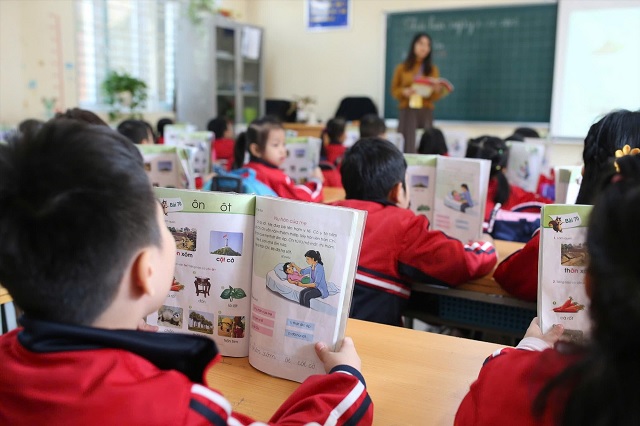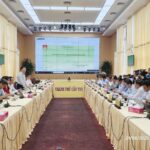On behalf of the Politburo, General Secretary To Lam recently issued Resolution 71 on breakthrough measures for the development of education and training.
According to the Resolution, the Party and State always consider education and training, along with science and technology, as top national priorities. However, the education sector still faces challenges and limitations and has not yet become a pivotal driving force for the country’s breakthrough development.
In the context of profound and comprehensive global changes, particularly with digital technology and artificial intelligence reshaping education worldwide, each country must redefine its vision and strategy for its education system in the future.
Vietnam is at a historic juncture for breakthrough development, and the task of building human resources is of utmost importance and urgency. This calls for radical measures to enhance education and training…

The Politburo calls for a unified set of textbooks nationwide
|
Achieving universal preschool education for 3-5-year-olds
Given the above context, the Politburo demands a strong and resolute focus on breakthrough measures for the development of education and training.
The Politburo sets the goal that by 2030, Vietnam will expand equitable access to and improve the quality of preschool and general education to reach advanced levels in the Asian region. It aims to establish a network of schools that cater to the diverse needs of students from all backgrounds and regions, with at least 80% of general education schools meeting national standards.
The resolution aims to achieve universal preschool education for children aged 3 to 5 and compulsory education up to lower secondary level. It targets at least 85% of people within the relevant age group completing upper secondary education, with no province or city falling below 60%.
Initial progress is expected in enhancing technological capabilities, artificial intelligence, and English language skills at the general education level. The education index contributing to the Human Development Index (HDI) is targeted to reach above 0.8, with the education inequality index reduced to below 10%.
The resolution aims for 50% of people of relevant ages to pursue education beyond the upper secondary level. It also targets 24% of the workforce to hold college or university degrees and at least 35% of students to major in basic sciences, engineering, and technology, including at least 6,000 doctoral students and 20,000 talented students in these fields.
By 2035, the resolution envisions a further modernized education system, making significant and solid progress in terms of access, equity, and quality. It aims to achieve universal upper secondary education and its equivalent. The goal is to have at least two higher education institutions ranked among the top 100 universities worldwide in specific fields according to reputable international rankings.
Looking ahead to 2045, Vietnam aspires to possess a modern, equitable, and high-quality national education system, ranking among the top 20 countries globally. All citizens will have lifelong learning opportunities to enhance their knowledge, skills, and maximum personal potential. High-quality human resources and scientific and technological talents will become the driving force and core competitive advantage for the country, contributing to Vietnam’s advancement as a developed, high-income nation.
The resolution aims for at least five higher education institutions to be ranked among the top 100 universities worldwide in specific fields according to reputable international rankings.
Guaranteeing comprehensive autonomy for higher education institutions
To achieve these goals and vision, the Politburo emphasizes the need for bold reforms in institutions, creating special and superior mechanisms and policies for the development of education and training.
It focuses on refining legal regulations to promptly address bottlenecks and constraints in institutions, mechanisms, and policies. The resolution calls for reducing management layers for educational institutions, ensuring the integration of professional management with personnel and financial management. It promotes the development of an open and interconnected education system that fosters lifelong learning and a learning society.
Special and superior policies are to be implemented to attract and retain talented teachers, with allowances for preschool and general education teachers increased to a minimum of 70% for teachers and 30% for staff, and 100% for teachers in particularly challenging areas, border and island regions, and ethnic minority areas.
Appropriate policies will be designed to attract talented individuals from outside the teaching profession to participate in teaching and training within educational institutions. A co-faculty regime will be established for talented individuals currently working in public service units, and mechanisms will be put in place to encourage the involvement of talented individuals in research activities within educational institutions.
The resolution calls for refining the regulations on staffing, standards, conditions, and recruitment and promotion processes for professors, associate professors, and other teaching positions, aligning them with international practices and the Vietnamese context.
Comprehensive autonomy will be guaranteed for higher education and vocational education institutions, regardless of their financial autonomy. Budget allocation will be based on mission, quality, and efficiency, with priority given to outcome-based ordering and task assignment for key sectors and fields.
Government spending on education and training will reach a minimum of 20% of the total state budget, including investment spending of at least 5% of the total state budget and higher education spending of at least 3% of the total state budget.
Financial support and preferential credit policies will be expanded for students to ensure that no one drops out of school due to financial constraints. A project to nurture talented individuals will be developed, prioritizing basic sciences, engineering, and technology.
Providing free textbooks for all students
The Politburo emphasizes prioritizing clean land funds and allowing flexible changes in land use purposes for educational institutions. It calls for focused efforts on land clearance and the provision of clean land for educational projects, along with exemptions from land use fees and reductions in land rent and land taxes for domestic educational institutions…
The Politburo emphasizes holistic education that nurtures morals, intelligence, physical health, and aesthetics, shaping the values of the new Vietnamese generation. This includes cultivating a culture of academic excellence, practicality, and integrity, coupled with the exemplary role of teachers in moral education…
The Politburo calls for a comprehensive digital transformation and the widespread application of digital technology and artificial intelligence in education and training…
It focuses on building a qualified and standardized team of teachers and improving the quality of preschool and general education infrastructure.
The Politburo directs the review and refinement of standards and norms to ensure the quantity, quality, and structure of the teaching staff. It calls for sufficient staffing of teachers and personnel according to the prescribed standards. Emphasis is placed on enhancing the quality of training and professional development for teachers and educational administrators, along with implementing preferential policies to attract high-achieving students to the teaching profession and providing housing support for teachers working in remote areas.
The Politburo calls for a review and assessment of the implementation of the General Education Program and ensuring the provision of a unified set of textbooks nationwide. By 2030, the goal is to provide free textbooks for all students.
A shift towards modern and active educational methods is emphasized, promoting self-learning, creative experiences, and encouraging students to develop independent thinking and problem-solving skills. Continuous reform of assessment methods aims to ensure honest evaluation of learning and teaching, along with holistic solutions to eradicate rampant private tutoring.
The Politburo also calls for the reform and modernization of vocational education to create a breakthrough in developing a highly skilled workforce.
Developing 3-5 world-class universities
Modernizing and elevating higher education, creating breakthroughs in developing high-quality human resources and talents, and driving research, innovation, and creativity are key focuses. The resolution calls for the urgent development of a strategic framework for higher education development. It involves reorganizing and restructuring higher education institutions, merging or disbanding those that fail to meet standards, and eliminating intermediary levels to ensure streamlined, unified, and efficient governance.
The resolution proposes studying the integration of research institutes with higher education institutions. Significant investments and special mechanisms will be dedicated to developing 3 to 5 world-class universities modeled on international research universities, fostering national talents. Priority will be given to allocating research funding, especially for basic research integrated with postgraduate training at higher education institutions.
Expanded programs and projects will be implemented to develop the faculty, increase support for faculty members pursuing advanced degrees domestically and abroad, and attract distinguished faculty members from foreign countries with superior incentives.
Resolution 68: Transforming Perceptions and Mindsets About the Private Sector
“Professor Dang Viet Anh highlights the ambitious goals set by Resolution 68, which envisions a significant boost in private enterprises in Vietnam by 2030. The resolution aims for a substantial increase, targeting at least 1 million additional private businesses in the country by the end of the decade.”
The Power Trio: BSH, VIG & TAPTAP’s Strategic Alliance for Sustainable Growth
As insurance needs become increasingly intertwined with life experiences, consumers demand swift and transparent solutions. The collaboration between BSH Insurance, VI Group, and TAPTAP does not merely bring insurance closer to digital-savvy consumers but also forges a multifaceted ecosystem where both customers and businesses thrive.
The Alphanam Group’s Ambitious Plans: Proposing 5 Mega Projects Totalling Over 1,000 Ha in Can Tho
The bustling city of Can Tho has big plans for the future, and it is knocking on Alphanam’s door to make them a reality. With a vision to kickstart development, the city proposes that Alphanam take the driver’s seat and coordinate efforts to break ground on one or two pivotal projects by 2025. This ambitious timeline underscores the urgency and potential for transformative growth in the region.

















